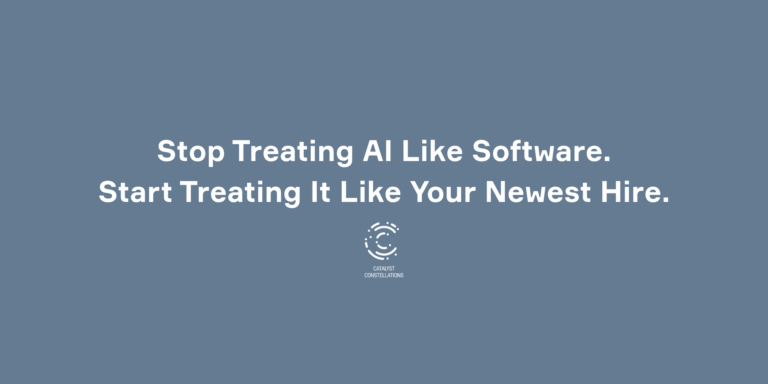You know you are driving change and are able to see things others don’t. You know you are tackling challenging problems that others may shy away from and that you are a spark that helps magic happen. But are you still struggling to articulate your value so others understand it?
This way of being is called different things such as Catalyst, change agent, problem solver, disruptor, rebel, systems thinker and more. But those labels don’t confidently empower you to talk about the magic you know you are enabling.
Together with other magic makers at the Oct 2018 Catalyst Constellations Retreat we outlined the steps to take to help anyone get clear on their unique value and find their own words.
Step One: Get clear on your personal magic and strengths.
What are the specific strengths you bring to any person, group, team or project you engage with? It can be difficult to see your own strengths clearly. To help there are several tools you could use.
- You could use a strength’s assessment such as Strengths Finder 2.0.
- You could ask those that have experienced your magic, especially colleagues. Questions you could ask include: What do you see as my top strengths? What do you feel is unique about my contributions compared to others? What do you feel I have helped accomplish that couldn’t have been done if I wasn’t here? If I quit tomorrow and I wasn’t here, what would you miss about me?
- You could analyze successes you’ve had and impacts you’ve made across projects you’ve worked on to look for patterns. What are the outcomes you have helped drive toward? If you have past performance reviews those could be a great help.
During this step you want to cast a broad net and not just think about your strengths and impacts in your current role. And once you have a list of your strengths you want to OWN that list so it doesn’t look foreign to you. This can happen by reading through your strengths over and over, writing out stories from your past where you were leveraging those strengths, maybe even say them out loud to trusted people.
Questions to consider: What are your natural strengths? What are the impacts and outcomes you have successfully driven toward?
Step Two: Translate the value to your audience.
Once you have a good sense of your unique strengths consider the value those strengths bring to the particular people you’d like to be able to express it to. For example you may want to be able to articulate your value within your own organization to help with an annual review, a promotion or changing your role. Or perhaps you are interviewing for a new job. Whoever your who, the key here is to recognize where they are coming from and what is valuable to them.
Let’s consider this case study as an example: Carmen is a program manager who was advocating for a promotion. She came to see her key strengths as framing a problem and building experiments to help the organization quickly decide if a product should move forward in development or not. She considered her boss and realized he viewed the world in terms of dollars, which was not her natural frame. So she modeled out the estimated cost savings of having helped make the decision to kill 3 projects over the past year and used her boss’ language to talk about how having been able to frame a product from the end users’ perspective and get feedback quickly allowed the organization to save an estimated $1.5M. She was thrilled when her promotion came through.
Questions to consider: What is the currency, world view and language of the people or person with whom you would like to discuss your value? What matters to them: time savings, money savings, better decisions, collaboration, etc? How do your strengths and outcomes help achieve those things?
Step Three: Communicate (aka articulate your value).
Once you have articulated and crystallized your value and translated it for specific audiences you need to figure out how and where to effectively communicate that value. Who you want to communicate with will help you decide which tools to use. For example if, like Carmen, are moving toward a promotion then case studies that show your impact and outcomes could be powerful. Or if you are applying for a new job you may want to ensure you communicate more broadly, perhaps updating LinkedIn, via social media, or collecting testimonials to share.
And be sure to be clear on the ASK you have for the person with whom you want to communicate. Carmen was crystal clear about her desire to be promoted. For you it might be becoming a mentor or board member. Or maybe you are asking for an introduction. Whatever it is, be sure you know what it is and that you state it clearly. Don’t make people guess.
Questions to consider: What exactly is my ASK and to whom? What is the best way for me to communicate my ASK?
It’s time to explore.
You are ready to explore your value and find the right words to articulate your value. Keep in mind that impostor syndrome might jump in and take hold trying to tell you you aren’t all that. But if you remember this is a process and just keep stepping through it, that feeling will definitely pass.
Taking the time to do this can make you feel more confident and change the trajectory of your career. Plus all of us magic makers and Catalysts are benefited as each of us get comfortable talking about our value!
***
This article on value was co-created through a discussion at the October 2018 Catalyst Constellations Retreat. There are 19 authors. Each author has the freedom to edit and share the article in whatever forms and forums they would like as it is open-source to all members of our group.
To learn more how we’re bringing Catalysts together right now, check out our course offerings. If you’re ready to fully step into your power, gain clarity and link to other Catalysts through our 3-day Catalyst Constellations Retreat, reach out to us directly and we’ll be in touch as COVID restriction lift and we start planning our next retreat.
By Abby VanMuijen, Alexis Duclos, Courtney Collins, Dan Trimble, David Shaw, Dax Stephens, Diana Acosta, Haila Fine, Justin Lokitz, Kirsty Stevenson, Mark Leung, Melora Zaner, Michael Bloxton, Shakeya Mcdow, Shannon Lucas, Tracey Lovejoy, Van Ton-Quinlivan, Veronica Stuart and Virginia Hamilton




